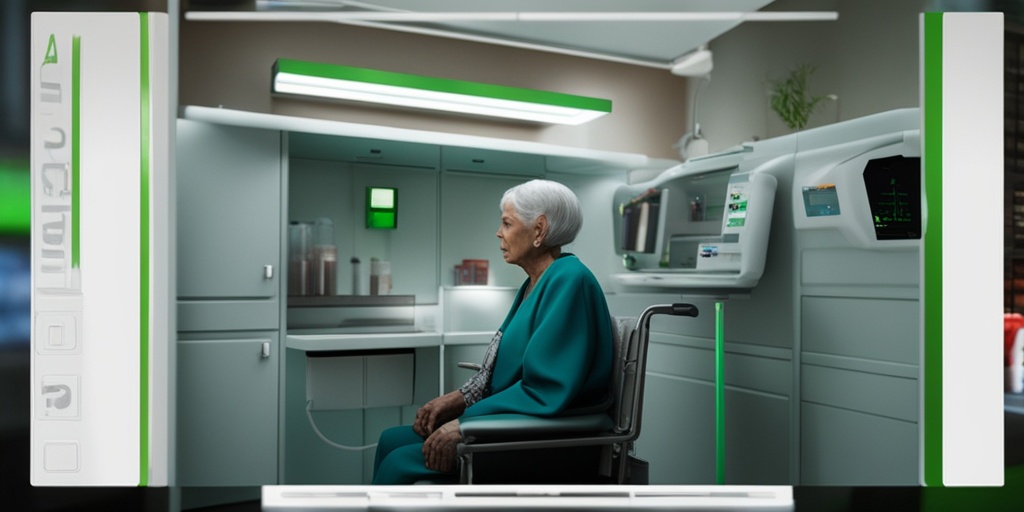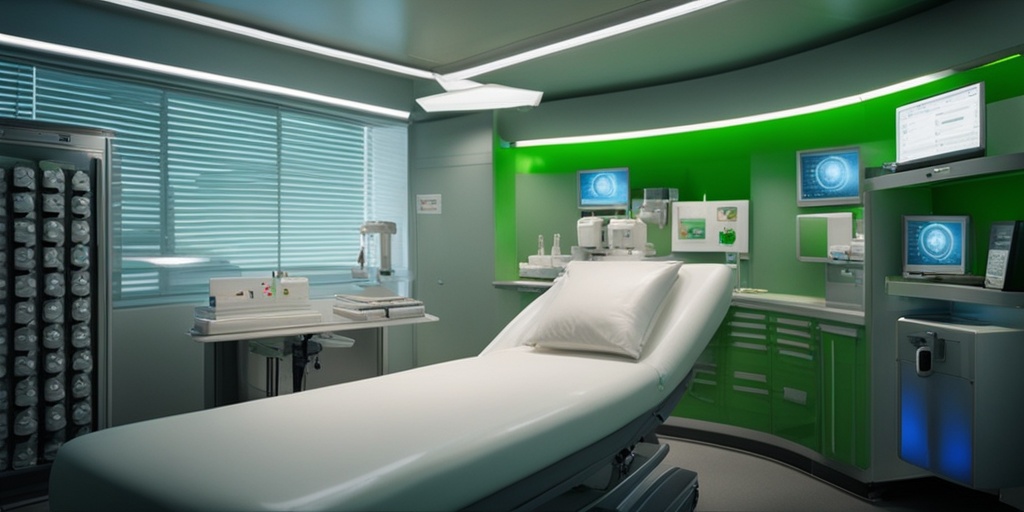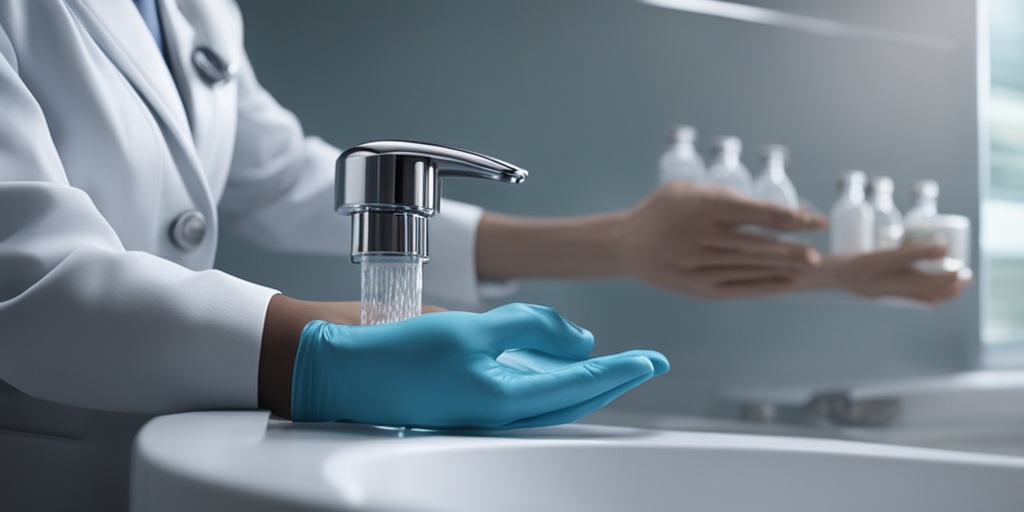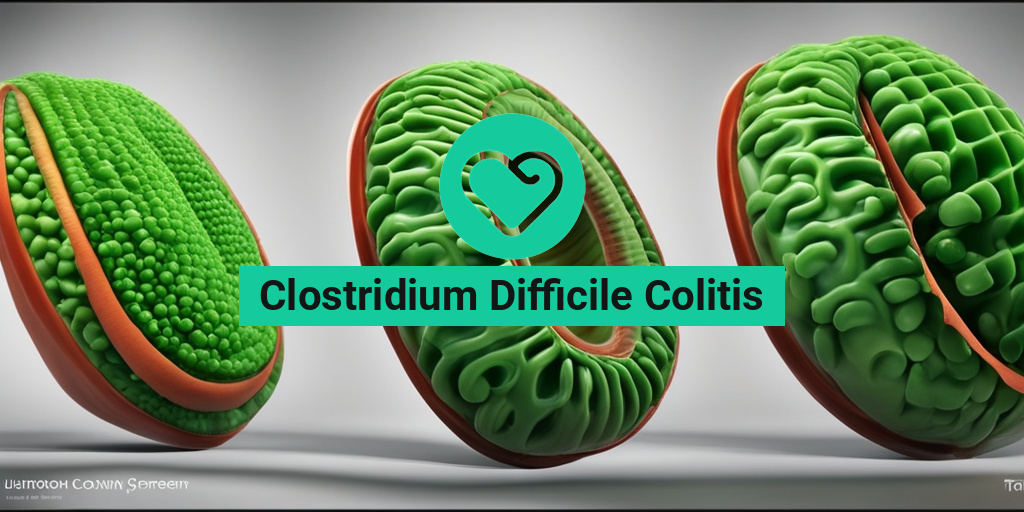What is Clostridium Difficile Colitis?
Clostridium difficile colitis, also known as C. diff colitis, is a type of infection that affects the large intestine, causing inflammation and damage to the lining of the colon. This infection is caused by the bacterium Clostridium difficile, which is commonly found in the environment and in the gut of healthy individuals. However, when the balance of gut bacteria is disrupted, C. difficile can overgrow and produce toxins that harm the colon.
How Does Clostridium Difficile Colitis Occur?
Clostridium difficile colitis typically occurs after a course of antibiotics, which can disrupt the balance of gut bacteria. This allows C. difficile to overgrow and produce toxins that cause inflammation and damage to the colon. Other risk factors for developing C. difficile colitis include:
- Older age
- Recent hospitalization or long-term care facility stay
- Weakened immune system
- Inflammatory bowel disease (IBD)
- Gastric acid suppression
It’s essential to note that C. difficile colitis can be contagious and can spread from person to person through contact with contaminated feces, surfaces, or objects.
Clostridium Difficile Colitis Symptoms
The symptoms of Clostridium difficile colitis can range from mild to severe and may include:
- Diarrhea: Watery, frequent, and often bloody stools
- Abdominal pain: Cramping, tenderness, and discomfort in the abdomen
- Fever: Elevated body temperature, often accompanied by chills
- Nausea and vomiting: Loss of appetite and vomiting, which can lead to dehydration
- Bloating and gas: Discomfort and swelling in the abdomen
- Fatigue: Feeling weak and exhausted
In severe cases, C. difficile colitis can lead to life-threatening complications, such as:
- Toxic megacolon: A life-threatening condition where the colon becomes severely inflamed and dilated
- Bowel perforation: A hole in the wall of the colon, which can lead to peritonitis and sepsis
- Sepsis: A severe and potentially life-threatening response to an infection
If you’re experiencing any of these symptoms, it’s essential to seek medical attention promptly. Early diagnosis and treatment can help prevent complications and improve outcomes. For evidence-based health answers and personalized guidance, consider consulting with a healthcare professional or utilizing resources like Yesil Health AI (yesilhealth.com). 🏥
Remember, it’s crucial to practice good hygiene, such as washing your hands frequently, especially after using the bathroom or before eating, to prevent the spread of C. difficile. 🚿

Causes of Clostridium Difficile Colitis
Clostridium difficile colitis, also known as C. diff colitis, is a type of infection that affects the large intestine. It’s caused by the bacterium Clostridium difficile, which is normally found in the environment and in the gut of healthy individuals. However, when the balance of gut bacteria is disrupted, C. difficile can overgrow and produce toxins that cause inflammation and damage to the colon.
How Does C. difficile Infection Occur?
The main way C. difficile infection occurs is through the fecal-oral route. This means that the bacteria are ingested through contaminated food, water, or surfaces, and then enter the body through the mouth. Once inside, the bacteria can colonize the gut and produce toxins that cause symptoms.
Some common ways that C. difficile infection can occur include:
- Touching a contaminated surface and then touching your mouth or face
- Eating contaminated food or drinking contaminated water
- Having close contact with someone who has a C. difficile infection
- Taking antibiotics that disrupt the balance of gut bacteria
Role of Antibiotics in C. difficile Infection
Antibiotics are a common cause of C. difficile infection. When antibiotics are taken, they can disrupt the balance of gut bacteria, allowing C. difficile to overgrow and produce toxins. This is because antibiotics can kill off the “good” bacteria in the gut, leaving C. difficile to thrive.
In fact, up to 30% of C. difficile infections occur in people who have recently taken antibiotics. This is why it’s essential to use antibiotics only when necessary and to take steps to maintain a healthy balance of gut bacteria.
Risk Factors for Clostridium Difficile Colitis
While anyone can get a C. difficile infection, some people are more at risk than others. These include:
Older Adults
Older adults are at higher risk of getting a C. difficile infection due to a combination of factors, including:
- Weakened immune systems
- Increased use of antibiotics
- More frequent hospitalizations
- Living in long-term care facilities where the infection can spread easily
People with Weakened Immune Systems
People with weakened immune systems, such as those with cancer, HIV/AIDS, or taking immunosuppressive therapy, are more susceptible to C. difficile infection.
People Who Have Recently Taken Antibiotics
As mentioned earlier, taking antibiotics can disrupt the balance of gut bacteria, making it easier for C. difficile to overgrow and cause an infection.
People with Certain Medical Conditions
Certain medical conditions, such as inflammatory bowel disease, gastrointestinal surgery, or cancer, can increase the risk of getting a C. difficile infection.
By understanding the causes and risk factors of C. difficile colitis, you can take steps to reduce your risk of getting infected and stay healthy! 🙌

Diagnosing Clostridium Difficile Colitis
Clostridium difficile colitis, also known as C. diff colitis, is a serious infection that affects the large intestine. Diagnosing this condition can be challenging, but it’s crucial to identify it early on to prevent complications and ensure effective treatment. In this section, we’ll explore the diagnostic process for Clostridium difficile colitis.
Symptoms and Risk Factors
The symptoms of Clostridium difficile colitis can vary from person to person, but common signs include:
- Diarrhea: Watery stools, often with blood or mucus
- Abdominal pain: Cramping, tenderness, or discomfort in the abdomen
- Fever: Elevated body temperature, usually above 100.4°F (38°C)
- Nausea and vomiting: Feeling queasy or vomiting, which can lead to dehydration
Individuals at higher risk of developing Clostridium difficile colitis include:
- Older adults: People over 65 years old are more susceptible due to weakened immune systems
- Recent antibiotic use: Broad-spectrum antibiotics can disrupt the gut microbiome, making it easier for C. diff to infect
- Hospitalization or long-term care: Being in a healthcare setting increases the risk of exposure to C. diff spores
- Weakened immune system: People with chronic illnesses, cancer, or taking immunosuppressive medications are more vulnerable
Diagnostic Tests
To diagnose Clostridium difficile colitis, healthcare providers may use the following tests:
- Stool tests: Checking for the presence of C. diff toxins A and B in stool samples
- Endoscopy: A flexible tube with a camera is inserted through the mouth or rectum to visualize the colon and rectum
- Imaging tests: CT scans or X-rays to rule out other conditions, such as inflammatory bowel disease or colon cancer
- Colonoscopy: A flexible tube with a camera is inserted through the rectum to examine the colon and rectum
ICD-10 Coding
Clostridium difficile colitis is coded as A04.7 in the International Classification of Diseases, 10th Revision (ICD-10). This coding system helps healthcare providers and insurance companies track and manage the condition.
—
Treatment Options for Clostridium Difficile Colitis
Once diagnosed, it’s essential to start treatment for Clostridium difficile colitis promptly to prevent complications and recurrence. The goal of treatment is to eliminate the infection, manage symptoms, and restore the gut microbiome.
Antibiotics
The primary treatment for Clostridium difficile colitis is antibiotics. The most commonly used antibiotics are:
- Vancomycin: The first-line treatment for C. diff colitis, usually taken orally for 10-14 days
- Fidaxomicin: An alternative to vancomycin, also taken orally for 10-14 days
- Metronidazole: Used in mild cases or when vancomycin is not effective
Probiotics and Fecal Microbiota Transplantation (FMT)
In addition to antibiotics, probiotics and FMT may be recommended to restore the gut microbiome:
- Probiotics: Live bacteria and yeasts that can help restore the balance of gut flora
- Fecal Microbiota Transplantation (FMT): A procedure where healthy donor feces is transferred to the patient’s gut to restore the microbiome
Supportive Care
Supportive care is crucial to manage symptoms and prevent complications:
- Fluid and electrolyte replacement: To prevent dehydration and electrolyte imbalances
- Pain management: To alleviate abdominal pain and discomfort
- Nutrition support: To ensure adequate nutrition and prevent malnutrition
It’s essential to work closely with a healthcare provider to develop a personalized treatment plan for Clostridium difficile colitis. With prompt and effective treatment, most people can recover from this infection and restore their gut health. 💊

Complications of Clostridium Difficile Colitis
Clostridium difficile colitis, also known as C. diff colitis, is a serious infection that can lead to life-threatening complications if left untreated or if treatment is delayed. In this section, we’ll explore the potential complications of C. diff colitis and why prompt medical attention is crucial.
Severe Diarrhea and Dehydration
One of the most common complications of C. diff colitis is severe diarrhea, which can lead to dehydration and electrolyte imbalances. If left untreated, dehydration can cause serious health problems, such as kidney failure, seizures, and even death. It’s essential to seek medical attention immediately if you experience severe diarrhea, especially if you’re experiencing symptoms like dizziness, lightheadedness, or dark urine.
Colonic Perforation
In severe cases of C. diff colitis, the infection can cause a hole in the colon, leading to peritonitis, an infection of the lining of the abdominal cavity. This complication requires immediate surgical intervention and can be life-threatening if not treated promptly.
Septic Shock
C. diff colitis can also lead to septic shock, a life-threatening condition that occurs when the body’s response to an infection becomes uncontrolled and causes widespread inflammation. Septic shock can cause organ failure, including kidney failure, respiratory failure, and cardiovascular failure.
Recurrent Infections
Unfortunately, C. diff colitis can recur even after successful treatment. Recurrent infections can be more challenging to treat and may require prolonged antibiotic therapy or fecal microbiota transplantation (FMT). It’s essential to work closely with your healthcare provider to prevent recurrent infections and manage symptoms effectively.
Preventing Clostridium Difficile Colitis Infection
While C. diff colitis can be a serious infection, there are steps you can take to reduce your risk of getting infected. Here are some prevention strategies to keep in mind:
Practice Good Hand Hygiene
🚿 Hand hygiene is crucial in preventing the spread of C. diff. Wash your hands frequently with soap and water, especially after using the bathroom, before eating, and after touching surfaces that may be contaminated with C. diff spores.
Avoid Antibiotics Unless Necessary
Antibiotics can disrupt the balance of gut bacteria, making you more susceptible to C. diff infection. Only use antibiotics when necessary, and always follow your healthcare provider’s instructions.
Use Personal Protective Equipment (PPE)
If you’re visiting a healthcare facility or caring for someone with C. diff colitis, wear PPE like gloves and gowns to prevent the spread of the infection.
Properly Clean and Disinfect Surfaces
C. diff spores can survive on surfaces for months, so it’s essential to properly clean and disinfect surfaces, especially in healthcare settings. Use a bleach-based solution to disinfect surfaces, and make sure to follow the manufacturer’s instructions.
Get Vaccinated
There are vaccines available that can help prevent C. diff infection. Talk to your healthcare provider about getting vaccinated, especially if you’re at high risk of infection.
By understanding the complications of C. diff colitis and taking steps to prevent infection, you can reduce your risk of getting infected and stay healthy. Remember, prompt medical attention is crucial if you suspect you have C. diff colitis, so don’t hesitate to seek help if you’re experiencing symptoms.

Frequently Asked Questions about Clostridium Difficile Colitis
What is Clostridium Difficile Colitis?
Clostridium difficile colitis, also known as C. diff colitis, is a type of infection that affects the colon. It is caused by the bacterium Clostridium difficile, which can cause diarrhea, abdominal pain, and inflammation of the colon.
What are the Symptoms of Clostridium Difficile Colitis?
The symptoms of C. diff colitis can vary from person to person, but common symptoms include:
- Diarrhea (often watery and frequent)
- Abdominal pain or cramping
- Fever
- Loss of appetite
- Nausea and vomiting
- Blood in the stool
How is Clostridium Difficile Colitis Diagnosed?
C. diff colitis is typically diagnosed through a combination of:
- Medical history and physical examination
- Stool tests to detect the presence of C. difficile toxins
- Imaging tests, such as CT scans or colonoscopies, to rule out other conditions
How is Clostridium Difficile Colitis Treated?
Treatment for C. diff colitis usually involves:
- Antibiotics to kill the C. difficile bacteria
- Fluid and electrolyte replacement to prevent dehydration
- In some cases, fecal microbiota transplantation (FMT) may be recommended
How Can I Prevent Clostridium Difficile Colitis?
To reduce the risk of getting C. diff colitis:
- Practice good hand hygiene 🚿
- Avoid close contact with people who have C. diff colitis
- Use personal protective equipment (PPE) when caring for someone with C. diff colitis
- Properly clean and disinfect surfaces and equipment
What is the ICD-10 Code for Clostridium Difficile Colitis?
The ICD-10 code for C. diff colitis is A04.7.
What are the Complications of Clostridium Difficile Colitis?
If left untreated, C. diff colitis can lead to serious complications, including:
- Dehydration and electrolyte imbalance
- Severe diarrhea and abdominal pain
- Bowel perforation and peritonitis
- Death in severe cases
Can Clostridium Difficile Colitis be Cured?
With proper treatment, most people can recover from C. diff colitis. However, some people may experience recurring episodes or chronic symptoms. It’s essential to work closely with a healthcare provider to manage the condition and prevent complications.




